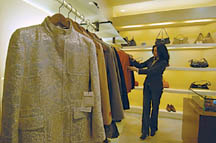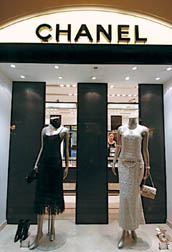|
dailynews |
|
|
|
|
|
OTHER LINKS |

|

|

|
Indians turn to luxury of luxuries
HIGH LIFE: Wealthy housewife Dee thought nothing of spending more than 2,000 dollars on two handbags at a major hotel in New Delhi, where high-end labels such as Louis Vuitton and Bulgari have set up shop. "In the past we had to travel abroad to buy these brands. Now everything is available here," said 41-year-old Dee, who like many Indians uses only one name. She and her advertising professional husband - with their big imported car, at least three evenings out a week and an equal number of trips abroad a year - are typical of the growing number of Indians who have developed an appetite for luxury since the country's economy was opened up in the 1990s. With India's economic growth hovering around 7.5 percent, the number of multi-millionaires is blossoming, the middle class is burgeoning and a taste for Western luxury goods is developing. According to a study by global consulting firm McKinsey, India - while it may have 250 million poor people - also has around 1.2 million people in the extremely rich bracket. "This is 'global India' - only a third as large as (the) comparable segment in China but expanding by more than 20 percent a year," McKinsey said.
"These households buy branded products, vacation abroad, own a number of car and television sets, and generally behave like their counterparts in developed markets." Foreign luxury brands, which tried but failed to make a dent in the Indian market in the 1980s, have read the latest trends well. Two years ago, Porsche entered the Indian market, Chanel arrived last year and is about to expand its operations in New Delhi, and Gucci is thinking seriously of setting up shop here. The market for luxury products in India is estimated to be worth around 454 million dollars annually but growing at a rate of 20 percent a year - which could rocket to a whopping 50 percent, India's Trade Minister Kamal Nath said recently at the country's first luxury goods conference in Mumbai. "The economic situation is getting better and better," the head of Porsche India, Ashish Chordia, told AFP. "There is a new generation of nouveaux riches (which) is growing, Indians are more international, there is more awareness of luxury - your way of life is what defines you. Before they only spent money on material goods, now they are spending more on intangibles," said Chordia. The economic boom has changed the way upper middle class Indians think.
Within the well-off middle class, "there is a section of young people who have other aspirations," said Xavier Bertrand, general manager of Chanel's subsidiary in India. "With the development of the media since the start of the 1990s, Indians are being confronted with the same images and references as are people in Europe and the United States. They started having evenings out, going to restaurants."In 2004, imports of French perfume by India increased by 29 percent as compared to the previous year. In restaurants of Sheraton hotels, the clientele has increased by more than 35 percent in the past decade. "In the past, Indians spent all their money on raising their children," said C.B. Narang, who is in charge of Sheraton's restaurants.
"Today, life is easier, there are loans, so they are discovering that it is easier for them to access money and to spend it." But while the taste for luxury is being cultivated, India is not yet an "eldorado" for luxury products, warn those in the know. The market "is still in its infancy," says Bertrand. Two major obstacles inherited from the protectionist era remain - a prohibition on foreign companies investing in retail in India and very high taxes, which on luxury cars top 100 percent. Foreign brand retailers also bemoaned the lack of adequate commercial space. "I only see luxury retail space in five-star hotels," Paolo Zegna, chief of the Zegna group, told the Press Trust of India news agency. "We cannot have a superficial presence."(AFP) |







